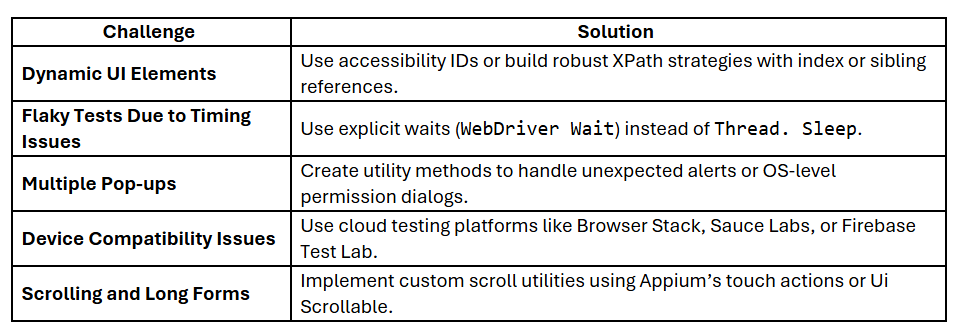Get Started with Appium - A Simple Guide for 2025
In today’s fast-paced development cycles, mobile automation has become a crucial part of the QA process.

Mastering Mobile Automation with Appium
In today’s fast-paced development cycles, mobile automation has become a crucial part of the QA process. As mobile applications evolve rapidly, testing them manually with every build becomes a bottleneck. This blog explores the challenges of mobile automation and introduces Appium a powerful framework designed to handle both Android and iOS automation effectively.
Why Mobile Automation Matters
The mobile landscape is highly dynamic, with frequent releases, diverse device configurations, and evolving user expectations. Manual testing alone cannot meet the scale or speed of modern development practices.
Here’s why automation is essential
- Faster Releases: Continuous delivery and Agile sprints demand rapid testing.
- Device Diversity: Testing across various devices, screen sizes, and OS versions is impractical without automation.
- Stable Regression Testing: Automated test suites ensure existing features are not impacted by new changes.
- Scalability: Automating core scenarios frees up manual testers for exploratory or edge case testing.
Why Choose Appium
Appium is one of the most popular tools for mobile automation due to its flexibility and ease of integration.
- Cross-Platform Support: Write one test and run it on both Android and iOS.
- Uses WebDriver Protocol: If you’re familiar with Selenium, Appium is easy to adopt.
- Language-Agnostic: Supports Java, Python, JavaScript, Ruby, and more.
- Supports Native, Hybrid, and Web Apps: Appium works across multiple application types.
- Open Source with Active Community: Constant updates and support make it a safe long-term investment.
Framework Architecture Overview
A modern mobile automation framework should be designed for reusability, maintainability, and scalability.
Core Components
- Appium + Selenium: Automate app flows using familiar Selenium-style commands with Appium under the hood.
- Cucumber (BDD): Write test cases in Gherkin syntax for better readability and collaboration between QA, dev, and product teams.
- TestNG: Enables grouping, parallel execution, annotations (@BeforeSuite, @AfterTest), and detailed HTML reporting.
- Page Object Model (POM): Helps separate test logic from UI interactions by creating reusable page classes.
- Utility Classes: For common actions like scrolling, waits, file handling, and reading test data.
- Dynamic XPath Handling: Write functions to generate XPaths dynamically, improving stability over hard-coded paths.
Challenges in Mobile Automation and How to Handle Them

Handling Static vs. Dynamic Scripts
- Static Scripts: Best for stable screens with fixed layouts.
- Dynamic Scripts: Ideal for complex forms or dynamic components that vary with user data or environment.
For example, use a loop to iterate through each form component based on a common parent XPath. After processing all visible components, perform a controlled scroll to bring new components into view.
Best Practices for a Robust Framework
- Code Reusability: Encapsulate logic in reusable methods. Avoid code duplication.
- Modular Design: Break tests into small, testable methods using POM.
- Separation of Concerns: Keep test data, locators, test logic, and utility methods in separate classes.
- Parameterization: Use .properties or .json files for storing device capabilities and app configurations.
- Logging and Reporting: Integrate logs using Log4j or SLF4J and generate reports using Extent Reports, Allure, or TestNG.
Integrations That Elevate Your Framework
- CI/CD Tools: Jenkins, GitHub Actions, GitLab CI for pipeline automation.
- Cloud Device Labs: Browser Stack, Kobi ton, Sauce Labs for testing on a range of devices.
- Test Management: Xray, Zephyr, or TestRail for mapping tests to requirements and tracking execution.
- Appium Inspector: A GUI tool to locate and validate mobile elements.
AI in Mobile Automation: Emerging Trends
Mobile test automation is now being enhanced with AI and machine learning
- Self-Healing Tests: AI tools detect and fix broken locators automatically.
- Visual Testing: Tools like Applitools help validate UI visually across different devices.
- Flaky Test Detection: ML algorithms analyze test patterns and highlight unstable scenarios.
- Test Optimization: Smart test prioritization based on code changes and test history.
These innovations reduce manual effort, improve coverage, and reduce execution time.
Key Considerations for Mobile Testing
- Device Matrix: Identify critical devices and OS versions based on user demographics.
- Permission Handling: Use Appium capabilities like autoGrantPermissions or ADB commands to pre-approve permissions.
- Performance Monitoring: Measure CPU usage, memory, and battery drain during test runs to catch performance regressions.
Conclusion
Building a mobile automation framework is more than just writing test scripts—it's about creating a maintainable, scalable ecosystem that supports continuous delivery and ensures product quality. With Appium at its core and a structured framework around it, you can achieve robust, reliable, and future-ready mobile test automation.
Summary
- Appium is flexible, cross-platform, and highly adaptable.
- Combine Selenium, Cucumber, and TestNG for a complete test suite.
- Follow best practices like POM, modular design, and dynamic scripting.
- Leverage cloud testing and CI/CD tools for scale.
- Explore AI-powered testing for the next level of automation.
Whether you're starting small or scaling up for enterprise needs, mobile automation with Appium provides a solid foundation for quality at speed.
Stay updated, stay curious, and automate smart!



